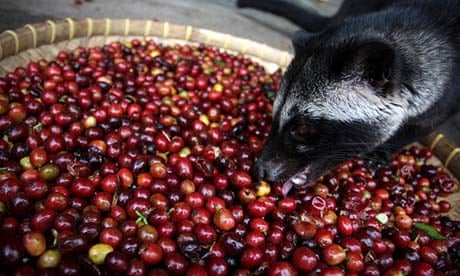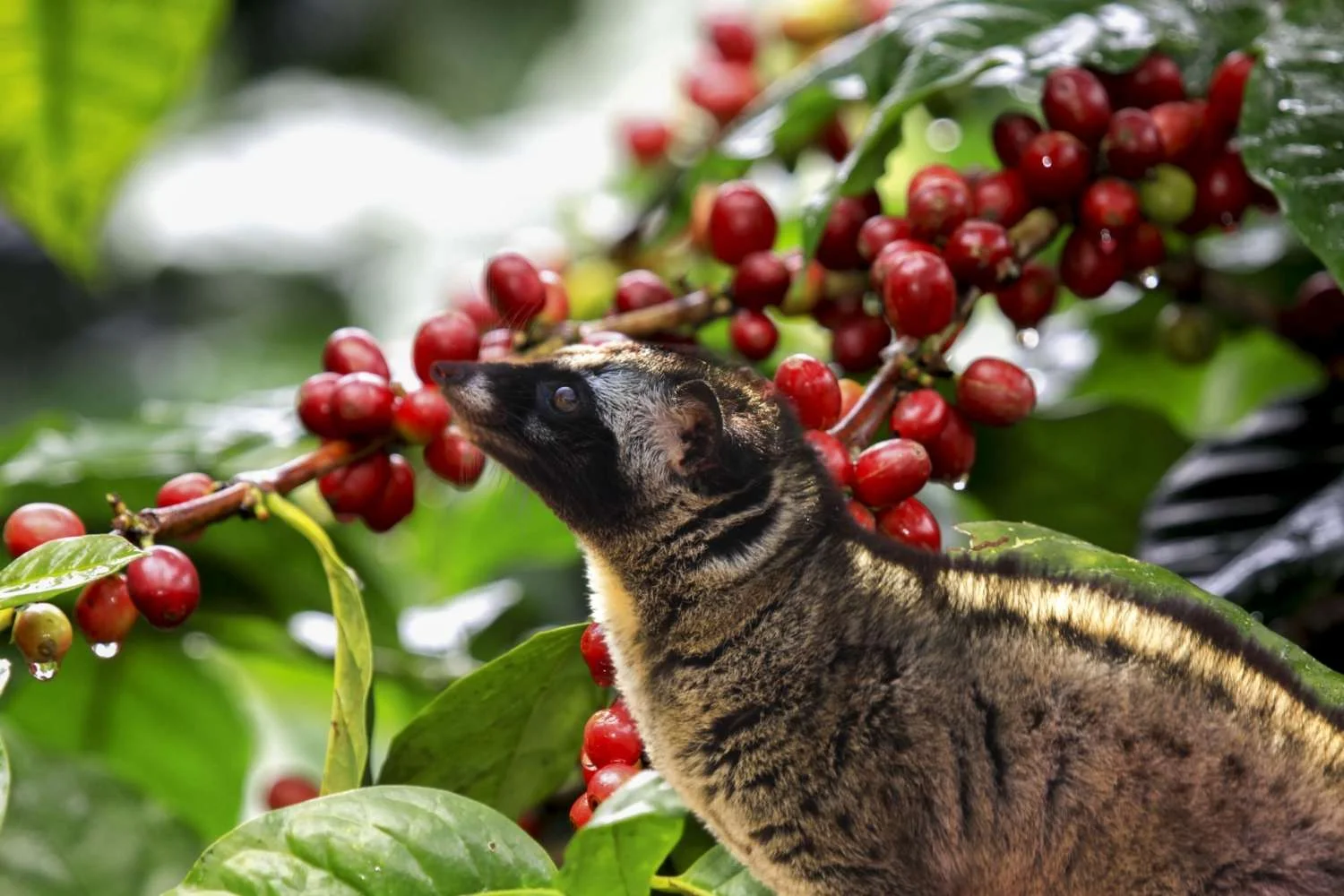Kopi Luwak: The Dark Side of "Speciality Coffee"
(and how you can still buy incredible coffee... without the cruelty)

Kopi Luwak, aka “civet cat coffee,” is the stuff of legends and late-night trivia. At first blush it sounds exotic: coffee beans plucked from the poop of a wild Asian palm civet. Luxury coffee via a jungle animal’s digestive tract? Sure, it makes a great story. For years, marketers have pushed Kopi Luwak as the world’s most exclusive coffee, with a price tag to match. But behind the novelty and big bucks lies a dark, unethical reality. At Yellow Bear, we think it’s time coffee lovers knew the truth—and discovered a better way to get their caffeine kick.
TL;DR – Quick Sips
-
Kopi Luwak’s “luxury” label is built on hype. Once rare and wild, it's now mostly mass-produced through animal cruelty.
-
Civet cruelty is rampant. Civets are confined, force-fed, and kept in dreadful conditions.
-
The taste? Mediocre. Experts agree Kopi Luwak is generally poor-quality coffee, bland, and overpriced.
-
Better coffee exists – ethically produced. Modern specialty coffee roasters offer incredible flavour without exploitation.
-
Yellow Bear champions ethical coffee. Transparent sourcing, farmer empowerment, and exceptional taste—without cruelty.
From Exotic Novelty to Marketing Myth
Kopi Luwak wasn’t always a synonym for animal cruelty. Initially, it had a kind of weird charm: civets roaming free, selecting ripe coffee cherries. These beans, fermented naturally in civet digestive tracts, were indeed rare. But as popularity soared, so did production—and ethics plummeted. This was not a product that was capable of scale.
Marketers sustained the myth of rarity, while mass civet farms sprang up to satisfy growing demand. Genuine rarity disappeared, the beans were no longer selected by Civet’s taste, and production was replaced by mass-farmed animal cruelty.
The Ugly Truth: Civets Suffering for Coffee
Today, Kopi Luwak production is synonymous with cruelty. Civets—normally solitary and nocturnal—are routinely caged, force-fed coffee cherries, and kept in deplorable conditions (think Fois Gras, but for coffee). Investigations consistently expose civets in distress, malnourished, injured, traumatised by confinement and often sharing cages with dead civets.
Many civets are illegally captured from the wild, forced into a lifetime of suffering to produce novelty coffee for unsuspecting tourists and consumers.
Spoiler Alert: Kopi Luwak Isn’t Great Coffee
Let’s bust another myth: Kopi Luwak isn’t even good coffee. Q-graders (like Sommeliers but for coffee) consistently rate it as bland, earthy, and underwhelming compared to genuine specialty coffees. It lacks complexity, vibrancy, and consistency.
Worse still, many Kopi Luwak products are diluted or outright fake, mixed with regular low-quality beans. Studies have shown nearly half of tested Kopi Luwak samples were fraudulent. How do you know that what you’re buying is legit?

Dulce Franco - Sítio Belém
from the farm Donas do Café, an entirely female owned Brazilian farm that we have been buying from since 2022 and a great alternative to K.L
Bad Taste in Your Mouth? Now you know where it came from, it should give a good idea why…
If your cup of Kopi Luwak has ever left you underwhelmed or missing what everyone else is hyping themselves up about, perhaps there's good reason. Coffee sourced from suffering animals and misleading marketing isn’t just unethical—it rarely tastes good. That stale, earthy bitterness might be your conscience (and palate) urging you towards ethical, quality coffee.
Every cup of coffee comes with a story, and now you know Kopi Luwak’s uncomfortable truth. Great coffee doesn’t require cruelty or deception—choose ethically farmed, transparent coffees and enjoy better flavours with a clear conscience.

New Brews, No Abuse: Ethical Alternatives on the Rise
You don’t need a civet’s digestive tract for extraordinary coffee. Modern specialty coffee has moved beyond gimmicks, focusing on ethical production and innovative processing. Look for the following buzzwords
-
Super Rare varietals: look for Pink Bourbon, Geisha, Sidra and SL28. They exhibit exquisite flavours, record-breaking quality, and are usually all ethically produced.
-
Anaerobic Fermentation Process: Carefully controlled fermentation producing unique, fruity flavours. These are the coffees that usually blow your socks off!
-
Natural & Honey Processes: Beans dried naturally with fruit intact for sweetness and complexity.
-
Look for the Coffee Producer being referenced by name: Big names like Sebastian Ramirez, Jairo Arcila, his son Felipé Arcila, Marie Rosa Oidor, Claudia Rivera and Wilton Benitez to name but a few!
Today’s coffee producers use science and skill—not cruelty—to craft remarkable coffees. Ethical and delicious options abound, offering extraordinary taste experiences without animal exploitation.

Sebastian Ramirez on his farm "El Placer"
Farmers as Scientists: The Real Future of “Exotic” Coffee
At Yellow Bear, we celebrate producers who blend tradition with innovation. These "coffee scientists" experiment rigorously—adjusting fermentation methods, varietals, and processing techniques to unlock amazing flavours naturally. This ethical innovation is coffee’s exciting future—no animals harmed.

Claudia Rivera on her farm "El Porvenir" - the first coffee we ever bought!
Why Yellow Bear Won’t Touch Kopi Luwak (and What We Do Instead)
At Yellow Bear Coffee Roasters, ethics and transparency guide us. To be clear: we’ll never roast or sell Kopi Luwak. Animal cruelty, lack of transparency, and subpar quality directly oppose our values.
We focus on coffees with genuine rarity—traceable, expertly produced, and transparently sourced. By supporting sustainable farming and ethical practices, we ensure every cup tastes exceptional without exploitation.
Selling Kopi Luwak? Consider the Message You’re Sending

If you're a coffee shop, roastery, or retailer, the products you offer communicate your values clearly.
Selling Kopi Luwak sends a message about your commitment (or lack thereof) to animal welfare and ethical sourcing That customers are becoming less and less willing to tolerate.
Maybe you didn’t know. That’s fair. But now you do.
As consumer awareness grows, so should yours. Ignorance in the information age is no longer an excuse—it’s a liability.
If your product leaves a bad taste—literally and figuratively—it’s time to consider exactly where it came from. Ethical specialty coffee is the future; cruelty has no place in it.
Brew a Better Future: Join the Ethical Coffee Movement
Knowledge is power. Here's what you can do now:
-
Spread awareness: Share Kopi Luwak’s reality and support ethical choices.
-
Support ethical roasters: Vote with your wallet for transparency, quality, and ethics.
-
Ask questions: Ethical coffee brands proudly share their sourcing stories.
-
Experiment: Explore specialty coffees—your taste buds and conscience will thank you.
-
Stay curious: Join Yellow Bear Journal, follow ethical coffee developments, and deepen your coffee appreciation.
At Yellow Bear, coffee is a force for good. Join our community, subscribe, or follow us online. Choose coffees that leave a great taste—ethically and literally—in your mouth.
Discover ethically-sourced speciailty coffees here and be part of coffee’s cruelty-free future. Your coffee ritual—and conscience—will thank you.


